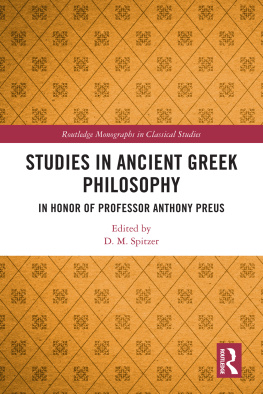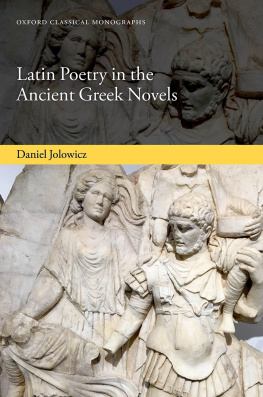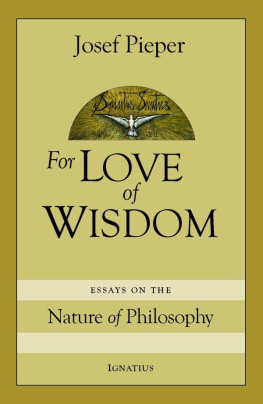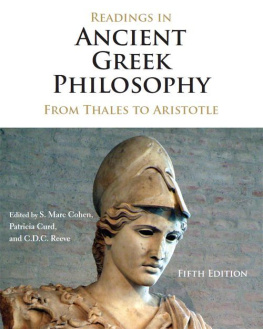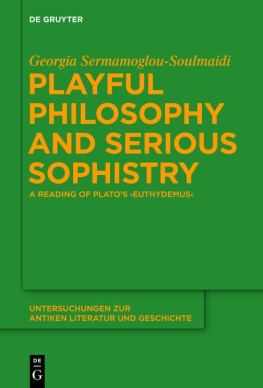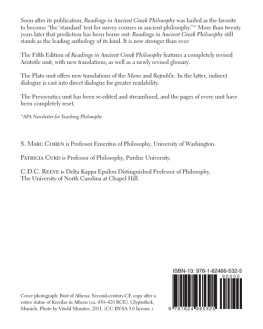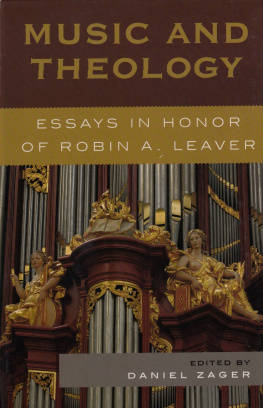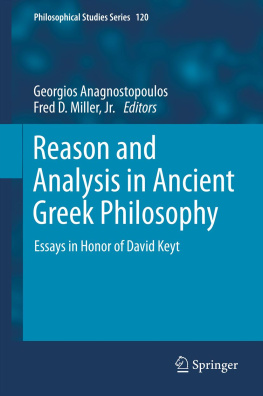Georgia Sermamoglou-Soulmaidi - Wisdom, Love, and Friendship in Ancient Greek Philosophy: Essays in Honor of Daniel Devereux
Here you can read online Georgia Sermamoglou-Soulmaidi - Wisdom, Love, and Friendship in Ancient Greek Philosophy: Essays in Honor of Daniel Devereux full text of the book (entire story) in english for free. Download pdf and epub, get meaning, cover and reviews about this ebook. year: 2020, publisher: De Gruyter, genre: Science. Description of the work, (preface) as well as reviews are available. Best literature library LitArk.com created for fans of good reading and offers a wide selection of genres:
Romance novel
Science fiction
Adventure
Detective
Science
History
Home and family
Prose
Art
Politics
Computer
Non-fiction
Religion
Business
Children
Humor
Choose a favorite category and find really read worthwhile books. Enjoy immersion in the world of imagination, feel the emotions of the characters or learn something new for yourself, make an fascinating discovery.

- Book:Wisdom, Love, and Friendship in Ancient Greek Philosophy: Essays in Honor of Daniel Devereux
- Author:
- Publisher:De Gruyter
- Genre:
- Year:2020
- Rating:5 / 5
- Favourites:Add to favourites
- Your mark:
- 100
- 1
- 2
- 3
- 4
- 5
Wisdom, Love, and Friendship in Ancient Greek Philosophy: Essays in Honor of Daniel Devereux: summary, description and annotation
We offer to read an annotation, description, summary or preface (depends on what the author of the book "Wisdom, Love, and Friendship in Ancient Greek Philosophy: Essays in Honor of Daniel Devereux" wrote himself). If you haven't found the necessary information about the book — write in the comments, we will try to find it.
Wisdom, Love, and Friendship in Ancient Greek Philosophy: Essays in Honor of Daniel Devereux — read online for free the complete book (whole text) full work
Below is the text of the book, divided by pages. System saving the place of the last page read, allows you to conveniently read the book "Wisdom, Love, and Friendship in Ancient Greek Philosophy: Essays in Honor of Daniel Devereux" online for free, without having to search again every time where you left off. Put a bookmark, and you can go to the page where you finished reading at any time.
Font size:
Interval:
Bookmark:
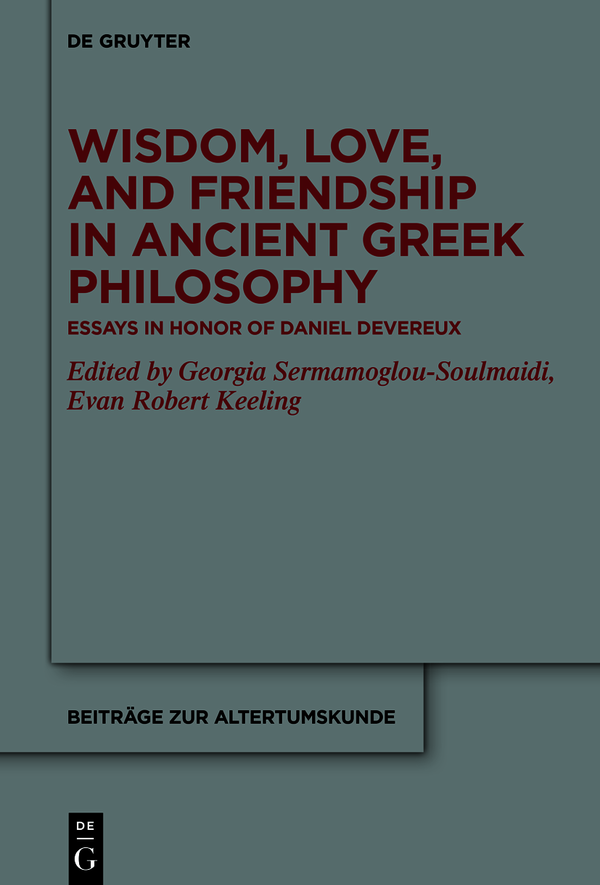
Beitrge zur Altertumskunde
Edited by
Volume
ISBN 9783110701210
e-ISBN (PDF) 9783110702217
e-ISBN (EPUB) 9783110702378
Bibliographic information published by the Deutsche Nationalbibliothek
The Deutsche Nationalbibliothek lists this publication in the Deutsche Nationalbibliografie; detailed bibliographic data are available on the Internet at http://dnb.dnb.de.
2021 Walter de Gruyter GmbH, Berlin/Boston
This volume of essays is a Festschrift for Dan Devereux, who taught at the University of Virginia for more than 40 years. In his time at Virginia he has mentored and inspired many students, graduates and undergraduates, and has made major contributions to Platos ethics, Aristotles metaphysics, and many other areas of Greek philosophy. As he has recently retired, the time is ripe to recognize these contributions. To this end a number of his colleagues, scholars and recent students have contributed to this volume in his honor.
The present book discusses friendship, love, and wisdom. Philia (friendship) and ers (love) are topics of major philosophical interest in Plato and Aristotle; they are also topics of growing interest and importance in contemporary philosophy, much of which is inspired by ancient discussions. Philosophy is itself a special sort of love, viz. the love of wisdom. Loving in the right way is very closely connected to doing philosophy, cultivating wisdom, and living well.
Wisdoms central importance is brought out in Michael Ferejohns discussion of wisdom and good fortune in Platos Euthydemus. Ferejohn examines some passages in the Euthydemus where Socrates seems to commit himself to the implausible position that anyone who possesses wisdom does not need good fortune in addition in order to do well and be eudaimn. He first considers and rejects attempts to avoid this consequence by attributing to Socrates the Proto-Stoic view that wisdom consists in eliminating all desires whose satisfaction is contingent upon external factors. He then examines the broader context of the problematic passages and argues that, according to Socrates, good fortune is one of those goods that cant be pursued or acquired directly, and the best and only way to acquire good fortune is by cultivating wisdom. Andrew Beer argues that the great aspiration of Platos Gorgias is towards a rhetoric of friendship, one that takes as its model the style of conversation both practiced and promoted by Socrates himself. The argument draws upon the many passages wherein Socrates pauses from his argument to reflect on the nature and ultimate purpose of his style of conversation; Plato thus depicts a kind of speech that can generate and foster the most stable kind of friendship. Continuing our focus on the Gorgias, James Doyle discusses the relationship between Socrates and his most interesting interlocutor in the dialogue, Callicles. Doyle brings out the conflict between these two characters pre-rational commitments their loves. Given these underlying psychological differences, the use of dialectic is put into question. Plato is showing us, Doyle argues, that there are sorts of psychic conflict which need not manifest themselves in contradictory beliefs. Georgia Sermamoglou-Soulmaidi discusses love in Platos Alcibiades, questioning a long-standing interpretation of Platonic love as entirely self-involved on the part of the lover, and proposing that the beloved is in fact loved for his own sake, rather than for the benefit the lover expects to draw from the relationship. Jenny Strauss Clay proposes a reconstruction of the spatial arrangements in the andrn in Platos Symposium. She explores the ways in which the seating arrangement reflects the interactions between the guests, including role reversals between lovers and objects of love. Gwen Nally seeks to explain why beauty stands atop the philosophical lovers epistemic ascent in the Symposium and, in doing so, proposes a novel theory of the significance of love in the philosophical enterprise. By loving correctly, she argues, one learns to properly perceive beauty; this, in turn, is a way of learning to infallibly identify what is good. In other words, love is such an important part of Platonic philosophy because, when properly undertaken when loves object is true beauty it is a foolproof way of pursuing what is valuable. Mary Louise Gill discusses love, true rhetoric, and philosophy, but her main argument is that in the Phaedrus Socrates is playing the role of true rhetorician in his oral performance, but our author Plato has written a work of philosophy and is prodding us to query Socrates critique of writing. Thus she is discussing two compositions, one oral and one written, and arguing that they are doing different things. Doug Reed addresses a worry that arises in the Phaedo: what will Socrates friends do when he is dead? Reed argues that the dialogue responds to this concern: By modeling a proper philosophical attitude and furnishing his friends with opportunities to engage in a genuine philosophical discussion, Socrates does his best to ensure that his friends will live well without him. The Phaedo is famous for its discussion of recollection and innatism, a new reading of which is given by Gail Fine. She discusses the general assumption that, in the Phaedo, Plato is some sort of innatist. But there are many varieties of innatism, and many reasons for favoring some version of it. She asks whether any version of innatism is favored in the Phaedo; on what grounds it is favored, if it is; and why, if it isnt, it is so often thought to be favored.
The role of love and friendship is also brought out, this time with respect to Aristotle, in Robert Boltons contribution, which explores the origins of Aristotles practical moral wisdom (phronsis) in love. In this ambitious paper, Bolton explores Aristotles role as trailblazer of an ethical school of thought which rejects the view that there is an accurate, universal account of how we ought to act. Since he rejects the Platonic picture on which moral knowledge is essentially the mere application of invariable and precise principles available in theoretical science, Aristotle is obliged to develop an alternative picture of moral knowledge which respects his idea that ethics does not admit the precision and invariability of theoretical science. To fill out Aristotles alternative account, Bolton explains the nature of and the way to reach phronsis.Evan Keeling discusses the necessity of philosophy itself for human life, arguing in addition that the Protrepticus represents early evidence for Aristotles distinction between practical and theoretical wisdom a distinction not accepted by Plato. Pierre Pellegrin also takes on Aristotles philia this time its political importance for Aristotles properly functioning polis. Love and friendship, therefore, have both an important ethical and political role to play. Terence Irwins contribution is a detailed analysis of some passages on friendship from the Magna Moralia, an under-discussed work. He draws some important conclusions for the relationship between the MM and Aristotles Nicomachean Ethics. Ending the volume is Michael Papazians piece on the possibility of Epicurean friendship. Papazian argues that Epicurean communal living and practices make it so that friendship, though painful when a loved one dies, still contributes to the good life. The paper also discusses the Stoic and some aspects of the Aristotelian view of friendship.
Font size:
Interval:
Bookmark:
Similar books «Wisdom, Love, and Friendship in Ancient Greek Philosophy: Essays in Honor of Daniel Devereux»
Look at similar books to Wisdom, Love, and Friendship in Ancient Greek Philosophy: Essays in Honor of Daniel Devereux. We have selected literature similar in name and meaning in the hope of providing readers with more options to find new, interesting, not yet read works.
Discussion, reviews of the book Wisdom, Love, and Friendship in Ancient Greek Philosophy: Essays in Honor of Daniel Devereux and just readers' own opinions. Leave your comments, write what you think about the work, its meaning or the main characters. Specify what exactly you liked and what you didn't like, and why you think so.

